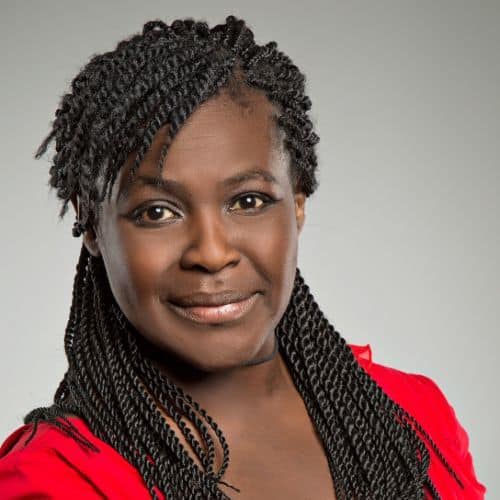To receive the downloadable spreadsheet of the podcast list, please provide us with your name and email address below. We'll send you the list via email shortly after you submit your information.

Maggie Aderin Pocock
Space scientist
Maggie Aderin-Pocock is best known as an English space scientist and co-presenter of the programme The Sky at Night.
Maggie Aderin Pocock's videos
What Maggie Aderin Pocock's clients say
"The audience were utterly hooked on the material and I don't think I've met anyone quite so warm and engaging in an age. The passion she has for the subject matter is utterly infectious. Please pass on our thanks for a truly fantastic talk."
"A different type of speaker for us - and the feedback was very enthusiastic"
"She did very well indeed - we wanted a speaker who would enthuse and inspire and Maggie's natural enthusiasm is infectious and although her work is more focused on 'space' her more general message about reaching high and being bold was equally strong"
"Dr. Maggie Aderin-Pocock met and exceeded all of our objectives. She was able to use tales of her own life and career to inspire the audience to pursue their dreams. The audience were very pleased with the speaker and came out of the ceremony feeling motivated. The audience were also very interested to hear that Dr. Aderin- Pocock had been working on the Rosetta Mission the week before, as this was another exciting story which she was able to share. Dr. Maggie Aderin-Pocock was extremely personable as she added humor to her speech to engage the audience."
"She received a great response and we had lots of teachers in the audience saying that if only she had taught them science, they would be astronauts by now!! Our event went down very well and her positive and funny presentation was a joy to listen to. More importantly, it pushed a love of STEM subjects and called for more females to take the lead in science which was a positive message that many of our delegates strongly agree with. Please do pass on my personal thanks to her - she was a highlight of the day."
Available for
Languages:
- English
Maggie Aderin Pocock's 2024 biography
Dr Maggie Aderin-Pocock MBE is a space scientist whose passion is presenting science to a general audience and demonstrating that you ‘don’t need a brain the size of a small planet’ to understand, participate in and enjoy science. Her BBC 2 programme, “Do We Really Need the Moon?” showed just that. The programme earned Maggie the talkback Thames new talent award at the prestigious Women in Film and TV Awards in December 2011.
She went on to present “Do We Really Need Satellites?” and was one of the main scientists on Channel 4’s Brave New World and panellist on Sky One’s science show ‘Ducks Quack Don’t Echo’. She is currently presenting Sky at Night on BBC 4, Mini Stargazing for Cbeebies and is a contributor on Channel 4’s quiz show ‘I Literally Just Told You’. She makes regular appearances on The One Show, Newsnight and Woman’s Hour and was a guest on Radio 4’s Desert Island Discs and BBC1’s Last Night of The Proms (2021). Her book ‘The Sky at Night’s Book of the Moon’ (BBC Books) was published in September 2018 and her children’s book ‘Dr Maggie’s Grand Tour of the Solar System’ (Michael O’Mara) was published in 2019. Her new children’s book ‘Am I Made of Stardust?’ is out in September (2022). Maggie is President of the British Science Association.
Maggie studied at Imperial College where she obtained her degree in Physics and her PhD in Mechanical Engineering. Since then she has spent much of her career making novel, bespoke instrumentation ranging from hand held land mine detectors to an optical subsystem for the James Webb Space Telescope.
To further share her love of science Maggie conducts “Tours of the Universe” and other public engagement activities, showing school children and adults around the world the wonders of space.
Maggie Aderin Pocock's 2024 talks & topics
The Power to Dream
The Dawn of a New Space Era
Inspiring Scientists
Women in Science: The Challenge
Follow Your Dreams
Maggie Aderin Pocock's 2024 speaking fees
- United Kingdom
Specific fees fall within the ranges shown. These are presented as a guide only and are subject to change without notice.
To get an exact quote for your event, click the button below.
